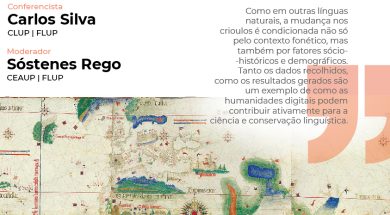News
Trade vs Slavery - The socio-historical and demographic conditions in the creation of the Creoles
On April 26, 5:00 p.m., at FLUP (room 201) and via Zoom (https://shorturl.at/cvBY4) you can attend the session“Trade vs. Slavery – The socio-historical and demographic conditions in the creation of Creoles“, with Carlos Silva (CLUP | FLUP) and moderated by Sóstenes Rego (CEAUP | FLUP)
During the conference, the understanding of the mechanisms involved in phonological stability will be discussed as crucial in determining the origins of Creoles and the contact phenomena from which they emerge. As in other natural languages, change in Creoles is conditioned not only by phonetic context (Gurevich, 2004), but also by socio-historical (Faraclas et al., 2007) and demographic factors. However, it needs to be established specifically what factors are relevant and weight they have in the transfer of phonological properties from the lexicalizing language to Creoles.
In this presentation, based on 667 words from 16 Portuguese-based creoles, we will analyze the correlation between their phonological stability values and three socio-historical factors: (i) the duration of the Portuguese influence, (ii) the conditions of contact of the Portuguese with the local communities and (iii) the number of language communities in contact.
Both the data collected and the results generated are an example of how the digital humanities can actively contribute to linguistic science and conservation.
This conference is part of the#CODA – Hacktivate the Humanities sessions. The idea of hacking, which popular culture has associated with breaking into or destroying systems, has emerged as a non-standard way to overcome obstacles and limitations of computer systems. With reference to its original character, this concept can be a powerful tool to activate and revitalize the humanities. Based on this premise, the cycle “Hacktivate the Humanities”, a CODA – Centre for Digital Culture and Innovation initiative, aims to bring together national and international researchers whose research can demonstrate how creative, and sometimes disruptive, approaches are used to transform the way we think and interact with culture, the arts, and the humanities. In this questioning, participants will also be challenged to rethink their own practices and, therefore, to seek new ways of (re)hacktivating their own journeys.
Organization:
CODA and CEAUP, with support from ISUP, CLUP, CEGOT, CITCEM.

